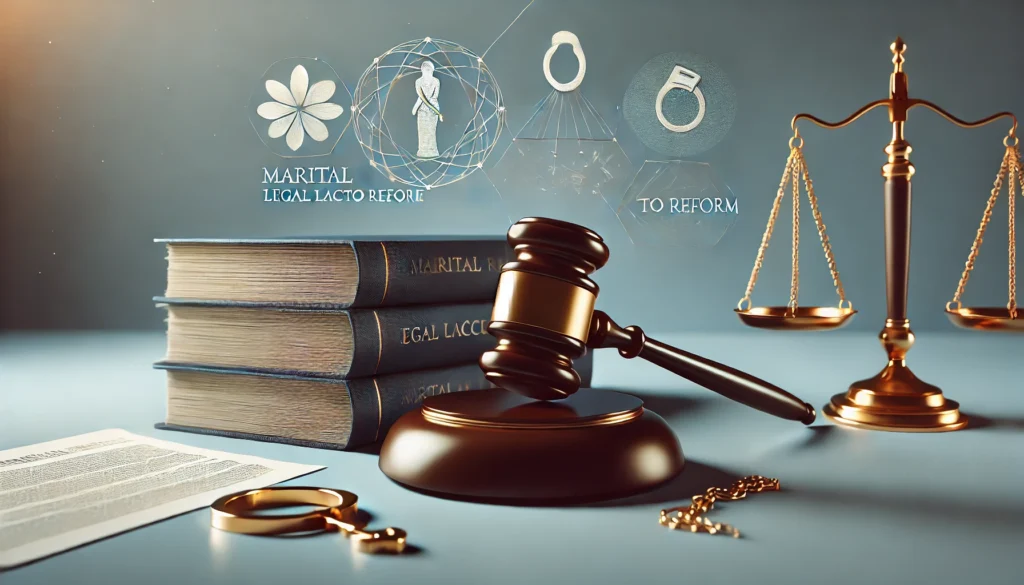Published On: 16th February, 2024
“(Succession Rights of Children in Void and Voidable Marriages under Hindu Law)”
INTRODUCTION:
Marriage represents a pivotal societal institution that exerts profound influence and furnishes a legal framework for the amalgamation of two individuals. It stands as the keystone for a spectrum of legal and societal entitlements, encompassing property rights, bequeathal rights, and the entitlements associated with the transference of familial legacies. Nevertheless, it is imperative to acknowledge that not all matrimonial unions obtain legal validity. Certain marriages, by virtue of assorted legal and procedural rationales, as defined in Section 11[1] and Section 12[2] of the Hindu Marriage Act, 1955, are categorized as either void or voidable.
It is frequently observed that offspring originating from unions characterized by legal nullity or potential annulment confront a perplexing confluence of social stigma and legal ambiguity, largely attributable to their parent’s marital status. Most void marriages are declared invalid for the reasons of bigamy, incest, or a lack of formal permission. Contrarily, voidable marriages may have problems with impotence, fraud, or non-consummation. The causes of invalidation can greatly influence how society perceives the validity of the offspring of these relationships. It is crucial to examine and modify legal frameworks in a society that is changing quickly and where various family structures are more prevalent in order to uphold the rights of everyone, especially vulnerable children.
This article aims to look into the law on the rights of children born out of void and voidable marriage and their succession rights under Hindu law.
BACKGROUND:
Specifically, a marriage is considered void under the Hindu Marriage Act when it fails to fulfill the stipulated conditions delineated in Section 5 of the said Act.[3]
Furthermore, it is noteworthy that a marriage may also assume the status of being voidable, contingent upon circumstances and considerations associated with either party involved in the union. In 1976, Section 16 of the Hindu Marriage Act (HMA), 1955,[4] underwent a significant amendment through the Marriage Laws (Amendment) Act.[5] This legislative alteration marked a pivotal departure from the hitherto prevalent common law perspective, which categorically deemed children born within marriages classified as void or voidable as ‘illegitimate’ ‘ipso jure’. The rationale underlying this legislative reform was to effectuate a socially beneficial purpose, namely, the eradication of the stigma of illegitimacy that unjustly befell children arising from such unions. It is imperative to underscore that these children themselves bear no culpability for the legal nullity or voidability of their parents’ marriage.[6]
Prior to the 1976 amendment, the legitimacy of children born within void marriages was contingent upon the issuance of a decree of nullity pertaining to the said marriage under Section 11 of the Act.[7] In essence, the law recognized such children as legitimate only if a formal judicial decree rendered the marriage null and void, a condition that imposed a substantial legal burden.
Section 16 of the HMA assumes particular significance in its treatment of the offspring emanating from voidable marriages. Sub-section (2) of the aforementioned provision stipulates that the children born within voidable marriages shall be considered legitimate even upon the pronouncement of a decree of nullity. This legal posture effectively equates their legitimacy status to that of children born within marriages that were dissolved via a decree of divorce, as opposed to those marriages that are merely annulled.
Consequently, Section 16 confers the esteemed status of legitimacy upon the progeny born within both void and annulled voidable marriages, thereby redressing the historical legal disparity associated with such unions. In the case of Kalliani Amma,[8] the Court provided an interpretation of the legal fiction outlined in Section 16 of the HMA. The Court articulated that, in practical terms, children who were previously considered illegitimate must now be treated as legitimate, especially concerning matters related to inheriting the property of their parents. The legislative aim was solely to remove social stigma and not to disrupt the framework of a coparcenary that does not encompass the children specified in Section 16. However, the scope of this legal transformation is constrained to the inheritance of the parent’s property, and it does not extend to the inheritance of property from other family relations.
INTERPRETATION OF SUCCESSION RIGHTS TO ILLEGITIMATE CHILDREN:
According to a strict interpretation of Hindu teachings, it is generally believed that a child must be conceived within the confines of a legally recognized marriage to be considered legitimate. However, a pivotal decision by the Privy Council[9] has established that, within the framework of Hindu law, the crucial criterion for legitimacy is the child’s birth occurring during a valid marriage. This particular legal principle holds significant authority and is binding.
To be recognized as legitimate under the ordinary legal framework, a child must be born within the bounds of a lawful marital union. It is important to note that if a marriage is deemed void due to non-compliance with statutory requirements, any child born from such a union may, by virtue of this legal determination, be considered illegitimate.[10] This categorization applies either immediately or following a formal declaration or annulment of the marriage, depending on the specific circumstances of the case.
APPLICABILITY OF THE SUCCESSION RIGHTS TO LEGITIMATE CHILDREN UNDER SECTION 16 OF HMA.
The concept of legitimacy and its impact on inheritance rights within Hindu family law has undergone significant transformation. This research focuses on Section 16 of the Hindu Marriage Act of 1955, as amended in 1976, which marked a significant departure from traditional norms. Historically, children born out of wedlock were often deemed illegitimate and had no claim to their father’s inheritance. They were primarily associated with their mother and each other, forming what was referred to as illegitimate kinship under the Hindu Succession Act. The Amendment Act of 1976 (Act 68 of 1976)[11] substantially changed the legal status of illegitimate children. Section 16 of the Hindu Marriage Act, which previously declared children born before or after the commencement of the Amendment Act as illegitimate in void or voidable marriages, was revised.[12] This amendment aimed to recognize the legitimacy of such children and grant them inheritance rights. Section 16 maintains a broad and inclusive definition of “property,” ensuring that illegitimate children can inherit all property their parents own.
Article 14 of the Constitution of India[13] provides for the principle of equality before the law and equal protection of the laws. It allows for reasonable classification with intelligible differentia, which means that differential treatment can be justified based on a rational and reasonable basis. In the context of children from various marriages, different legal statuses can provide a valid basis for distinct treatment. This classification protects the interests of both legitimate offspring and innocent co-parceners, ensuring a balanced and fair approach to inheritance and property rights. This inclusive approach aims to provide comprehensive protection and inheritance rights to these children. The amendments introduced by the Hindu Marriage Act of 1976 represent a significant step towards recognizing the legitimacy of children born in void or voidable marriages under Hindu family law. By removing the stigma of illegitimacy and ensuring inheritance rights for such children, these legal provisions contribute to a more equitable and inclusive legal framework.
In contrast to a legitimate son, an illegitimate offspring does not possess any entitlement to his father’s ancestral property and does not establish a coparcenary relationship with the father. Consequently, the legal rights of an illegitimate son are confined solely to receiving maintenance during his father’s lifetime. Nevertheless, a provision exists wherein the father retains the prerogative to bestow upon the illegitimate son a portion of his property during his own lifetime, which may be equivalent to that apportioned to his lawful sons.[14]
Before implementing the Hindu Succession Act,[15] an illegitimate son would inherit his father’s estate as a coparcener alongside the legitimate sons, and he retained the right to claim a partition of the estate upon the father’s demise. However, due to the absence of a legitimate kinship connection, he was ineligible to replace his father under the provisions of the Act. It is noteworthy that an amendment in 1976, specifically Section 16, introduced a legal fiction deeming illegitimate children as legitimate for all practical intents, including succession to family properties.[16] Nevertheless, the legal interpretation and judicial stance have resulted in a discernible precedent. Specifically, a child born out of a void or voidable marriage is restricted to asserting a claim on the parents’ self-acquired property, rather than ancestral property. This transformation in the legal landscape has significant implications for the inheritance rights of illegitimate children within the Hindu legal framework, effectively acknowledging their status while concurrently placing constraints on their inheritance claims, notably with regard to ancestral properties.
FINAL VERDICT IN REVANASIDDAPA V. MALLIKARJUN & ORS.:
(OTHER IMPORTANT CASE LAWS)
The case of Jinia Keotin v. Kumar Sitaram Manjhi[17] involved a verdict where the court held that children born from void or illegal marriages, despite being protected under Section 16 of the Hindu Succession Act, should not be treated the same as children born from lawful marriages regarding their entitlement to inherit ancestral property. The court emphasized that Section 16(3) explicitly denies legal rights to inherit ancestral or coparcenary property for children born from void or voidable marriages.
The decisions in Jinia Keotin, Neelamma,[18] and BharathaMatha[19] were later questioned in the case of Revanasiddappa v. Mallikarjun.[20] Section 16(3) does not specify qualifiers like “ancestral” or “coparcenary” when referring to “property,” and any attempt by the judiciary to introduce such qualifications is considered judicial legislating and unduly severe when denying property rights to children void or voidable marriages. Section 10 Rule 1 of the Hindu Succession Act[21] treats heirs without differentiating based on the legitimacy of their birth, indicating no intention to discriminate among legitimate children. The Mitakshara law is based on a community of interest in coparcenary property, and a coparcener’s share crystallizes upon partition. The court’s interpretation of Section 6 involves accepting a hypothetical scenario of notional property[22] division before the demise of the individual. Even in the case of a void marriage, Section 16(1) of the Hindu Marriage Act[23] applies, implying a rightful share for a child in the assets designated for their parent.
In summary, the interpretation aligns with ensuring parity of treatment concerning coparcenary property. A child born from a void or voidable marriage is not entitled to a share in the notional division itself but has a rightful share in the coparcenary involving the child’s father and the father’s legitimate offspring.[24] Section 6(3) of the HSA[25] requires establishing the nature of the parent’s property subject to intestate succession to determine the entitlement of a person benefiting from the statutory grant of legitimacy under Section 16. The Explanation clause mandates a hypothetical division before the coparcener’s passing, and heirs receive their share according to Section 10 rules after the coparcener’s death.
CONCLUSION:
A legislative understanding of the provisions specified in Section 16 of the older statute, the Hindu Marriage Act, is implied by the Hindu Succession Act, passed after the Hindu Marriage Act. Notably, the Hindu Succession Act’s definition of legitimate heirs does not exclude children legally recognized under Section 16 of the Hindu Marriage Act from this group. It is logical to conclude that if the Parliament had wanted to exempt these “legitimate children” from the scope of the Hindu Succession Act, there would have been explicit provisions to that effect. It matters that Section 16 of the Hindu Marriage Act grants validity. Failure to acknowledge this validity would affect the rights of children born into void or voidable marriages, who should not be stigmatized as “illegitimate” despite their parents’ connection not being recognized by the law.
The Hindu Marriage Act’s Section 16 recognizes such partnerships as genuine. Disregarding this truth would unfairly impact the rights of the children born from these relationships. According to Section 16 of the Hindu Marriage Act, subsection (3), only the parents have legal claims to anybody else’s property. Due consideration should be given to the rights and status of the child when evaluating the birth of a child from such a marriage, even if the parents’ connection is not legally recognized.
Reference(s):
[1] Hindu Marriage Act, 1955, §11, No. 25, Acts of Parliament, 1955 (India).
[2] Hindu Marriage Act, 1955, §12, No. 25, Acts of Parliament, 1955 (India).
[3] Hindu Marriage Act, 1955, §5, No. 25, Acts of Parliament, 1955 (India).
[4]Hindu Marriage Act, 1955, §16, No. 25, Acts of Parliament, 1955 (India).
[5] Marriage Laws (Amendment) Act, 1976, No. 68, Acts of Parliament, 1976 (India).
[6] J Venkatesan, Illegtimate Children entitled to ancestral property: Bench, The Hindu, April 08, 2011.
[7] supra note 1.
[8] Smt. Parayankandiyal vs K. Devi & Ors, (1996) 4 SCC 76.
[9] Revanasiddappa & Anr. versus Mallikarjun & Ors., 2023 SCC OnLine SC 1087.
[10] Padmakshi Sharma, Hindu Succession | Can Children Of Void/Voidable Marriages Claim Right In Their Parents’ Ancestral Property?, Live Law, (Jul. 27, 2023), https://www.livelaw.in/top-stories/hindu-succession-can-children-of-voidvoidable-marriages-claim-right-in-their-parents-ancestral-property-supreme-court-starts-hearing-reference-233705.
[11] supra note at 5.
[12] Kusum, Marriage laws (Amendment) Bill, 1974: A Critique, 1975, Vol. 17. No. 4, pp 611- 617.
[13] INDIA Const. Art.14
[14] Utkarsh Kumar, Right of Illegitimate Children on Parental Property, 3 INDIAN J.L. & LEGAL Rsch. 1 (2021).
[15] Hindu Succession Act, 1956, No. 30, Acts of Parliament, 1956 (India).
[16] Mansi Bharat Cheda, Inheritance and Succession Rights of Illegitimate Child under Hindu laws in India, 2022.
[17] Jinia Keotin v Kumar Sitaram 2003 SCC 1 730.
[18] Neelama v Sarojamma 2006) 9 SCC 612.
[19] BharathaMatha v R Vijaya Renganathan (2010) 11 SCC 483.
[20] supra note at 9.
[21] Hindu Succession Act, 1956, §10 rule.1, No. 30, Acts of Parliament, 1956 (India).
[22] Gurupad Khandappa v Hirabai Khandappa Magdum (1978) 3 SCC 383.
[23] Hindu Marriage Act, 1955, §16, cl.1, No. 25, Acts of Parliament, 1955 (India).
[24] Id.
[25] Hindu Succession Act, 1956, §6 cl.3, No. 30, Acts of Parliament, 1956 (India).




